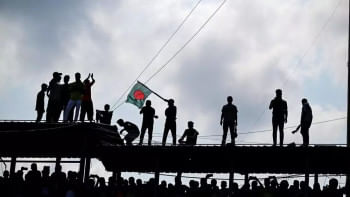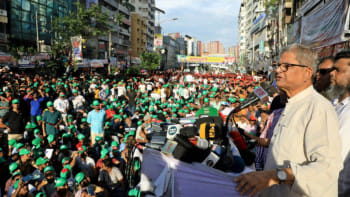The elephant in the room no one is talking about

Since Prof Muhammad Yunus took over as the head of the interim government, reforms have been very high on the national agenda. The whole country wants it. What is heartening is that even political parties, who are usually opposed to anything that does not originate from them, have worked closely with all the reform commissions and are now engaged in reaching a consensus.
However, one vital area has been left untouched in this discussion: reform of the political parties themselves. The nature, transparency, accountability, and inner democracy of political parties in Bangladesh determine the type of democracy and good governance they would be able to deliver. In fact, it greatly influences the society we end up with. The nature of the political parties who get elected determine to a large extent how the parliament, judiciary, and all its statutory bodies operate. They greatly influence the bureaucracy, almost all government institutions, the budget and its implementation, big business deals, etc. Very importantly, they control whatever oversight functions that are in the constitution.
There can be no denying the fact that one of the reasons behind the dismal state of democracy and governance in Bangladesh is directly related to the absence of internal democracy and public accountability in its political parties, especially of top party leadership.
From 1991, which marked the fall of Ershad and restoration of democracy, to 2024—a period of 33 years—we have had either the Bangladesh Nationalist Party (BNP) or the Awami League (AL) ruling the country, with two years of military-backed caretaker rule in 2007-2008. BNP ruled us for 10 years and a few months—one term in partnership with Jamaat—and AL ruled us for 21 years, the last 15 of which were uninterrupted, also with some partners who enjoyed ministerial positions but hardly any significant policy-framing roles.
Today, BNP is the party that everyone is looking at, talking about, and trying to understand better. History has opened doors for it that nobody expected so soon. In a free and fair election, BNP is most likely to emerge with the largest number of seats in parliament, not only for its wide acceptance but also for the massive rejection of its main rival, the Awami League. Hence, our focus today is on the party which is likely to significantly affect our future and on the person who is its second-in-command, Tarique Rahman.
Now is the most opportune moment for the BNP to emerge as a modern, democratic, innovative, and future-oriented party that fits in with the new aspirations of the people, especially the youth, and the needs of the 21st-century. The questions that rise in the public mind are: what sort of government will the BNP deliver? Are they fully aware of the aspirations of the people today, especially the youth? How much of democracy, accountability, fair play, and openness will this party present us with? Will it tolerate free media? The most asked question is: what sort of a leader will Tarique Rahman turn out to be? These questions are being raised not by the "enemies" of the BNP, but those who sincerely wish them well.
Students and their new leadership are absolutely right when they say that unless the constitution is amended, dictatorial tendencies will re-emerge. What we want to add is that amending the national constitution is eminently justified but hardly enough. It will have to be accompanied by changes in the constitution of political parties. This especially applies to the BNP as the party at the doorstep of power. We have carefully studied BNP's 31-point reform proposal titled "An Outline of the Structural Reforms of the State." As the document states, it is a reform proposal of the "state." Some of the points in the proposal are very farsighted and highly relevant. Suggestions of the formation of many "commissions" reflect what the interim government has undertaken. However, the proposal totally avoids any question of the reform of the party, which is highly centralised with all authorities concentrated in a single hand. As we have seen from experience—and BNP should, too—without intraparty democracy and accountability, it cannot deliver democracy and accountability in the governance process.
The reality is that the existing BNP party constitution makes the chairperson a repository of unquestioned and unquestionable powers. Under Section 1, "Duties, Powers, and responsibilities of the Chair…" the document says, "As the chief officer of the party, the chairman shall control, supervise and coordinate all activities of the party and for that purpose shall have the authority over the National Council, National Standing Committee, National Executive Committee, Subject Committees and other Committees nominated by the chairman and shall do control, supervise and coordinate their functions." Section 4 says, "The Chairman may dissolve the National Executive Committee, the National Standing committee… and other committees nominated by the chairman and reconstitute them…."
BNP's constitution gives all power to the chairperson, making him or her answerable to no one.
Seriously, can such a party run democratically? Do its values depict those of democracy? Can't there never be any dissent within? When such a party wins a majority in parliament, what will be the nature and functioning style of that government? It will totally be "top-down," and the top being only one person.
How will the parliament function when such a party commands majority? We know because we saw such a party in power, and we lived under its rule and suffered immensely. If there is no scope for a party activist ever to question a decision made by the party chief, and if the future of that person totally rests on the party boss, will anybody ever dare to dissent? Will such unchallenged powers not give rise to dictatorial mind-set that will most likely find fruition in near future. And if such a party wins majority in parliament and forms the government, won't it be a one-person government, a one-person parliament, a one-person everything? Again, we have seen it, lived under it, and suffered. Can the BNP ignore the widespread demand that we should eliminate all traces of such a possibility recurring? Is it wise for it to do so?
We commend Tarique Rahman and BNP for already showing some positive signs in this direction. (I find his speeches sensible and mature. What he said on Wednesday about "seeking reforms and not revenge on his oppressors" is highly praiseworthy. He seems to have made the best use of his forced exile in the UK. I also express my appreciation for the use of language both by him and BNP Chairperson Khaleda Zia. The humiliation and injustice inflicted on them by the Awami League and Sheikh Hasina personally could have easily triggered a very justifiable vilification of the latter. Both of them refrained from that and gave political discourse a new dignity and set an excellent precedent). Tarique Rahman's proposal of setting a two-term limit with further re-election prospect after a gap is better than what we have now. His openness to curtailment of PM's power and enhancement of that of the president is also welcome. The idea of an upper house is a refreshing change, but its membership should be proportionate, otherwise it will be a rubberstamp of the lower house preventing it from giving the government guidance.
However, all of the above changes will be mere cosmetic if the real power does not shift.
Here lies the strong logic for the posts of the PM, the party leader, and the leader of the House not being occupied by the same person. Even if the first two are the same, the PM and the party leader must be separate. Running the party and running the government must be in separate hands. Such a system helps the growth of leadership, assists the PM to be exposed to other views, and alerts them to be sensitive to the party's thinking. Otherwise, it is a one-person show that leads to massive misuse of power, which sometimes the over-empowered leader does not even know.
Tarique Rahman must fully grasp the uniqueness of his opportunity and the complexity of his challenges. We request him to objectively see the existing party power concentration in his hands and create avenues for expression of alternative and even dissenting views within the party structure without any threat to the person or the group concerned. Arguments may be put forward that such a scope will create disciplinary issues. Yes, they may, but without it, the party will be a sterile institution devoid of creativity, vibrancy, and in time filled with sycophants. We saw that happen to the Awami League leading to its detachment from the people. Sheikh Hasina not only destroyed government institutions, she also destroyed her party which had such a rich history and legacy.
BNP must learn from AL's mistakes. Tarique Rahman is making some timely decisions, and introducing intraparty democracy should be one of his goals.
Mahfuz Anam is the editor and publisher of The Daily Star.
Follow The Daily Star Opinion on Facebook for the latest opinions, commentaries and analyses by experts and professionals. To contribute your article or letter to The Daily Star Opinion, see our guidelines for submission.


 For all latest news, follow The Daily Star's Google News channel.
For all latest news, follow The Daily Star's Google News channel. 





Comments